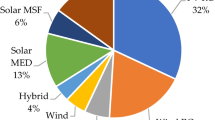Thermal distillation is one of the most common and reliable methods of water treatment, but its use is constrained by high energy-intensity. There are processes where thermal distillation is one of the main methods of liquid purification, for example for getting water for medical purposes. The most effective way of reducing distillate production cost is use of thermal transformers that allow recovery and regeneration of heat of liquid phase transformations. The results of mathematical-experimental investigations of high-temperature vapor-compression heat pump distiller using the natural working substance n-heptane are presented. The possibility of using standard leakproof small-capacity refrigeration compressor as the main means of pressure elevation and transfer of vapors of the working substance as a component of the heat pump distiller is shown. The efficiency and energy consumption data for the proposed equipment are obtained.


Similar content being viewed by others
References
Russian Federation Patent No. 2647731, C02F1/14, Mobile Apparatus for Liquid Distillation [in Russian], claimed by I. I. Malafeev, G. A. Ilyin, and N. V. Sharapov, published 19.03.2018.
I. M. Kalnin, A. S. Zhernakov, and S. B. Pustovalov, “A physical model of a heat pump saline water distiller,” Vestn. Mezhdunarod. Akad., No. 2, 12–21 (2010).
M. S. Talyzin, “Use of high-temperature heat pumps for heat recovery systems,” Kholod. Tekhn., No. 3, 10–12 (2017).
GOST 8865-93 (IEC 85-84), Electrical Insulation Systems. Assessment of Heat Resistance and Classification [in Russian], Gosstandart Rossii, Izd. Standartov, Moscow (2003).
B. S. Babakin and V. A. Vygodin, Domestic Refrigerators and Freezers [in Russian], Kolos, Moscow (1998).
A. I. Naberezhnykh and A. V. Demenev, “Theory and practice of making energy efficient domestic refrigerator operating at extremely high environmental temperature,” Inzhener. Vestn. Dona, No. 2 (25), 2013.
I. M. Kalnin’ and I. I. Malafeev, “Problem of selection of working substance for use in high-temperature heat pumps,” Kholod. Tekhn., No. 12, 21–29 (2014).
I. H. Bell, J. Wronski, S. Quoilin, et al., “Pure and pseudo-pure fluid thermophysical property library CoolPro,” Ind. Eng. Chem. Res., No. 53, 2498–2508 (2014).
A. V. Bykov, É. M. Bezhanishvili, I. M. Kalnin’, et al., Refrigeration Compressors: A Handbook [in Russian], 2nd ed., Kolos, Moscow (1992).
Author information
Authors and Affiliations
Corresponding author
Additional information
Translated from Khimicheskoe i Neftegazovoe Mashinostroenie, Vol. 55, No. 7, pp. 21–24, July, 2019.
Rights and permissions
About this article
Cite this article
Malafeev, I.I., Il’in, G.A. & Sapozhnikov, V.B. Mathematical-Experimental Assessment of Energy Efficiency of High-Temperature Heat Pump Distiller. Chem Petrol Eng 55, 556–561 (2019). https://doi.org/10.1007/s10556-019-00662-1
Published:
Issue Date:
DOI: https://doi.org/10.1007/s10556-019-00662-1




